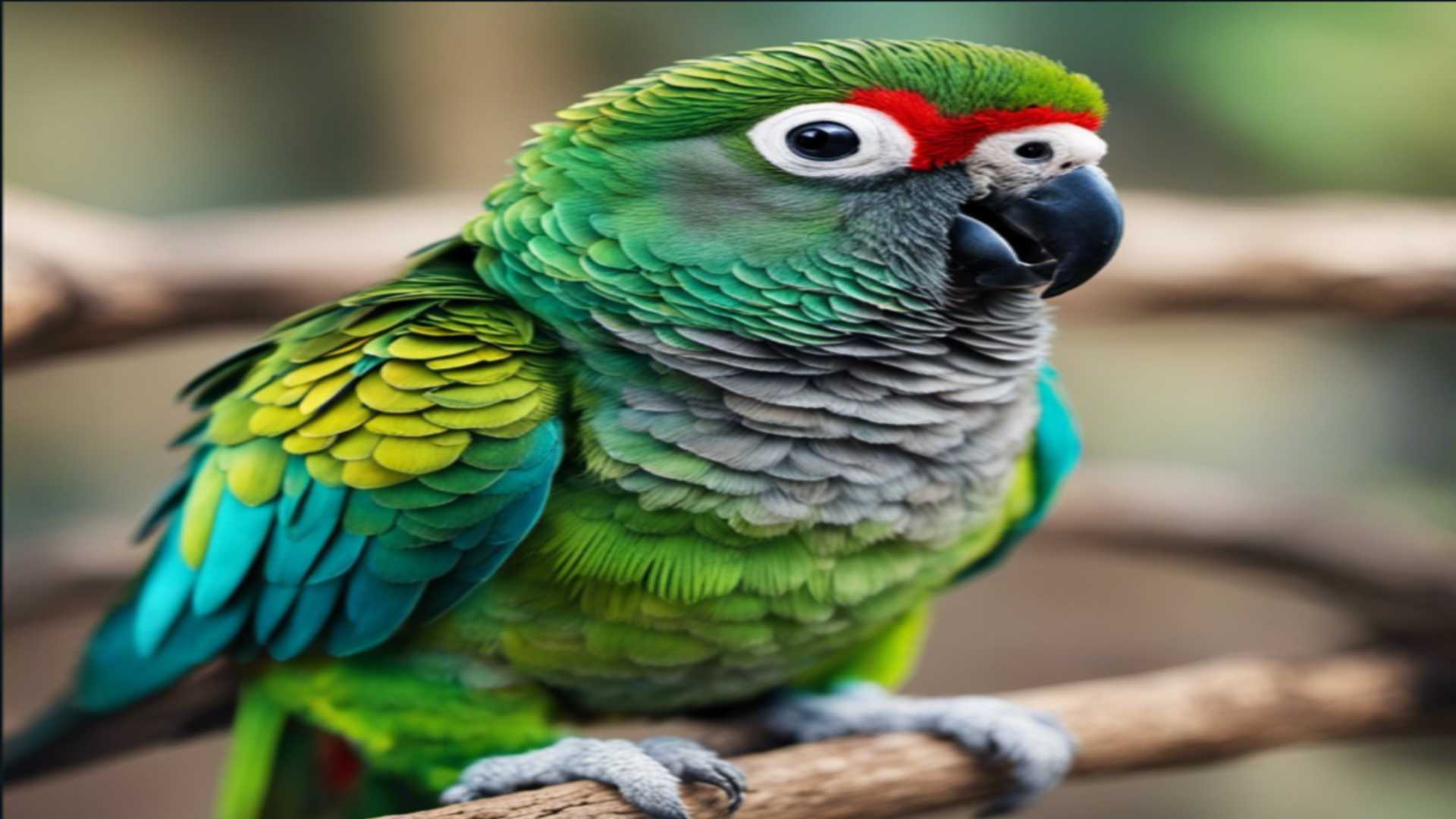Conures are known for being playful and friendly, but they can also be territorial and protective of their food and toys. So, do conures bite?
In this article, we will discuss the reasons why conures might bite and what you should do if your bird does attack. We’ll also provide some tips on how to prevent your conure from biting in the first place.
Why does your conure nibble on you?
Conures nibble on their owners as a way of exploring their surroundings and showing affection. It can also be a sign of curiosity or playfulness. However, if the nibbling becomes aggressive or painful, it’s important to redirect their behavior with toys or treats to prevent biting.
How to stop conures from biting?
To stop conures from biting, it’s important to understand the reason behind their behavior. Start by identifying triggers like fear, jealousy, or territorial aggression. Avoid punishing your conure as it can worsen the problem. Instead, provide positive reinforcement, proper training, and ample socialization to help prevent biting.
How to train a conure not to bite?
Conures are known for their playful and affectionate nature, but they can also exhibit biting behavior. If you’re wondering how to train a conure not to bite, there are some effective techniques you can try.
One method is to provide positive reinforcement when your conure behaves well.
This can be done through offering treats, praise, or simply giving attention when your bird is calm and not exhibiting aggressive behavior. By rewarding good behavior, you can help your conure understand what is expected of them. Consistency is key when trying to train a conure not to bite.
Establish clear rules and boundaries, and stick to them. Avoid reacting negatively to biting, as this can reinforce the behavior.
Instead, calmly remove your hand and redirect your conure’s attention to a more appropriate activity. It’s also important to understand why your conure may be biting. Biting can be a sign of fear, frustration, or even hormonal changes.
By identifying the root cause of the behavior, you can better address it and prevent future incidents.
Overall, patience and positive reinforcement are essential when training a conure not to bite. With time and dedication, you can help your feathered friend learn proper behavior and build a trusting relationship.
Why do conures bite?
There can be many reasons why a conure might bite, but some of the most common reasons include fear, pain, aggression, and boredom.
A conure may bite out of fear if it feels scared or threatened. This is most likely to happen when the bird is first introduced to a new person or environment.
In fact, many bites occur during preening, when the bird is feeling particularly vulnerable.
But let’s take a closer look at each of these reasons.
- Conures may bite out of fear if they feel scared or threatened. This is most likely to happen when the bird is first introduced to a new person or environment. If you are handling your conure and it suddenly bites you, it may be feeling scared or threatened and is trying to defend itself.
- Pain can also be a trigger for biting behavior in conures. If your bird is injured or ill, it may bite out of pain or confusion. If you suspect your conure is in pain, take it to the vet right away.
- Conures may also bite out of aggression. If your conure feels like it is being attacked or threatened, it may try to defend itself by biting. This is most likely to happen if the bird feels like its territory is being invaded.
- Boredom can also lead to biting behavior in conures. If your bird is not getting enough attention or stimulation, it may become bored and start to bite.
But don’t let your conure’s potential to bite scare you away. With proper care and handling, most bites can be prevented.
Do conures bite a lot?
In general, conures bite more than other types of pet birds. This is because they are more active and playful, which can sometimes lead to excitement-related biting.
However, conures can be trained not to bite, and most birds will only nip if they feel threatened or are trying to get your attention.
While most bites are relatively harmless, conures have sharp beaks that can cause cuts and scratches. If you’re worried about being bitten by a conure, there are some things you can do to prevent it from happening.
- Avoid handling your conure when it is tired or hungry.
- Don’t put your fingers near its mouth or face.
- Respect your conure’s personal space, and don’t try to hold it when it doesn’t want to be held.
- Be gentle when handling your conure and avoid sudden movements.
- Train your conure not to bite using positive reinforcement, such as rewards and praise.
A conure before biting will usually give warning signs, such as flaring its tail, hissing, or lunging. If you see these signs, remove your hand or finger from the area and give your bird some time to calm down.
If your conure does bite, try not to react too harshly. Yelling or hitting your bird will only make it more likely to bite again in the future. Instead, calmly remove your hand or finger from its mouth and put it in its cage.
Also, don’t forget that conures are known for being smart birds, so they never bite without a reason. If your bird is biting, there may be something wrong that you need to address.
I have a recent article that talks about conure intelligence, and how you can use this to your advantage when it comes to training your bird not to bite.
Click the link to learn more about it on my site.
How do I stop my conure from biting?
As a general rule, If your conure bites you, it is important to stay calm and avoid retaliating. Yelling or hitting the bird will only make the situation worse and could cause the bird to become more aggressive.
Instead, try to identify the reason why the bird bites you. Was it out of fear, pain, aggression, or boredom? Once you have identified the reason, you can take steps to address the issue.
For example, if your bird bites out of fear, try to slowly and gradually introduce it to new people and environments. If your bird is bored, try to provide it with more toys and attention.
If you are not sure why your bird bites you, it is best to consult a veterinarian or avian behaviorist.
Once you’ve identified the reason for the biting behavior, you can take steps to address the issue and prevent it from happening in the future.
Here are some helpful tips to keep in mind:
Bored conure
If your conure is bored, try to provide it with more toys and attention. Try hanging a bird toy from the ceiling of its cage or placing a mirror in the cage so it can interact with its reflection. You can also try training your conure to do simple tricks, such as stepping up on your finger or flying to you when called.
(source)
Aggressive conure
If your bird bites out of aggression, it is important to slowly and gradually introduce it to new people and environments. In fact, to do that, you’ll need to provide the bird with a lot of positive reinforcement, such as treats and praise, when it shows signs of good behavior.
Scared conure
If your bird is scared, try to make its environment as “bird-safe” as possible. This means providing it with a hiding place, such as a dark-colored towel draped over part of the cage, and keeping the environment quiet and calm.
Whether the reason might be, I want to emphasize, don’t yell at or hit your conure if it bites, as this will only make the behavior worse.
(source)
Instead, do not react to the bite and calmly put your bird back in its cage, and only pick it up again when it is calm.
Finally, remember that patience is key. Conures often take time to warm up to new people and environments. If you are patient and consistent with your training, your conure will eventually learn that biting is not acceptable behavior.
That being said, the more you’ll let your conure spend time outside its cage, the less likely it is to bite. So, make sure to provide your bird with plenty of opportunities to fly and explore its surroundings.
I explain all of this in more detail in my recent article. There you’ll learn how long you should keep your conure out of its cage, and whether or not you should cover your conure’s cage at night.
Simply click the link to learn more on my site.
That being said, if you are ever unsure about your conure’s behavior, it is always best to consult with a certified avian veterinarian or behaviorist.
How hard can a conure bite?
Conures are capable of breaking the skin and causing bleeding with their bites. They have sharp, hooked beaks designed for tearing meat, and their powerful jaws can deliver a crushing grip.
While conures can give you a painful bite, they are generally not considered to be aggressive birds. However, as mentioned before, if they feel threatened or uncomfortable, so, they may be nipping as a way to protect themselves.
As such, it is important for potential owners to learn more about a conure’s behavior before bringing one home.
Are conures aggressive?
While conures are not generally considered to be aggressive birds, they can have moments of aggression. This is usually seen when the bird feels threatened, or during the breeding season.
For example, a conure may bark, lunge, or bite if it feels that its cage is being invaded. If you have a conure, it’s important to provide plenty of toys and perches to help the bird feel secure in its environment.
In addition, it’s important to socialize your bird from an early age so that it learns to trust humans. With proper care and socialization, most conures will be gentle and loving pets.
Related questions
Why do conures bite ears?
In general, conures bite your ear because they’re trying to get attention. Conures are very social creatures and love interaction with their human companions. If they feel like they are being ignored, they may nibble on an earlobe as a way to get attention.
Why does my conure bite everything?
It is possible that they’re trying to assert dominance over you or another object, particularly if you’ve been moving things around in their space. Conures are also known to be curious birds and may bite objects out of curiosity.
Final thoughts
In this article, we went over the reasons why conures might bite and what you can do to prevent it.
If your bird does bite, it’s important to remain calm and consistent with your training. With time and patience, your conure will learn that biting is not acceptable behavior.
Remember, if you are ever unsure about your bird’s behavior, it is always best to consult with a certified avian veterinarian or behaviorist.
Those who are considering adding one of these lively birds to their family should be prepared to handle an occasional nip.
Also, if you are thinking about getting a conure, be sure to check out my other articles on everything you need to know about these amazing birds! Click the link to learn more on my site.





